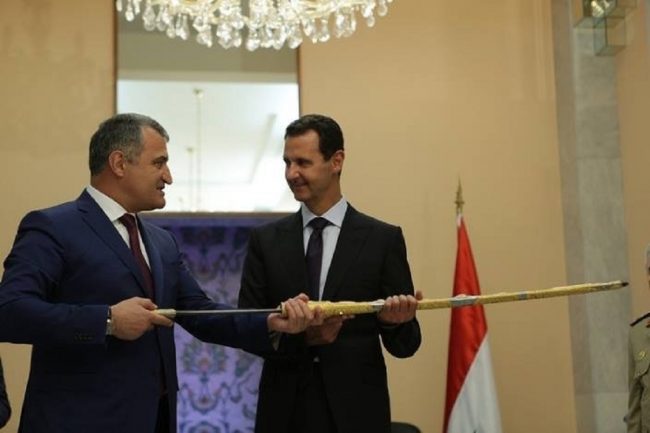
 Syrian president Bashar al-Assad has accepted an invitation to visit Tskhinvali (Tskhinval), South Ossetian president Anatoly Bibilov announced in a Monday press conference. The Georgian government condemned the announcement, calling it a ‘gross violation of international norms’.
Syrian president Bashar al-Assad has accepted an invitation to visit Tskhinvali (Tskhinval), South Ossetian president Anatoly Bibilov announced in a Monday press conference. The Georgian government condemned the announcement, calling it a ‘gross violation of international norms’.
‘On behalf of our people, I invited Assad to visit our republic, and he accepted’, said Bibilov, adding that he did not yet know whether Assad would be in Tskhinvali on the 10th anniversary of the Russian recognition of South Ossetian independence. He said that Assad’s visit would depend on the ‘situation in Syria’, as the Syrian leader has a particularly ‘busy schedule’.
Russia recognised South Ossetian and Abkhazian independence on 26 August 2008, following the August War. South Ossetia celebrates Independence Day on 20 September, marking its own proclamation of independence in 1992.
Bibilov said the situation in Syria was stabilising, as the ‘war against international terrorism is coming to an end, and most of Syria’s territory has been liberated’. He noted that South Ossetia had at one time faced ‘state terrorism from Georgia, so the republic understands the difficult challenges the Syrian people have to overcome’.
A South Ossetian delegation — including Bibilov, Foreign Minister Dmitry Medoyev, and Minister for Economic Development Gennady Kokoyev — visited Damascus on 23–25 July, following a 22 July agreement signed by Medoyev and Syrian Foreign Minister Walid Muallem.
During the visit, Assad and Bibilov signed a ‘treaty of friendship and cooperation’ between Syria and South Ossetia. The agreement promotes bilateral economic and legal cooperation to facilitate ‘entrepreneurship, investment, and other economic activities’, including trade. Authorities in Tskhinvali announced that South Ossetia would lower tariffs on imports of Syrian products by 75%.
Bibilov said the Syrian and South Ossetian Chambers of Commerce would establish formal ties to help Syrian business establish themselves in South Ossetia, with clearly outlined ‘rules and possibilities’ for the republic.
According to the South Ossetian authorities, Bibilov also met with Syrian Prime Minister Imad Khamis. South Ossetian news agency Res cited Khamis as saying that ‘today, the Syrian Arab Republic longs for peace. As [the country] undergoes reconstruction, only friendly nations — Russia, Iran, South Ossetia — can participate in that process’.
Res also reported that Bibilov presented Assad with the ‘Uatsamonga Order — South Ossetia’s highest military award’ — previously given to Venezuelan President Hugo Chavez and Nicaraguan President Daniel Ortega upon their recognition of South Ossetian independence. Bibilov also gave Assad a Caucasian sabre, supposedly forged with Damascus steel.
‘An irreversible process’
On 29 May, Syria became the fifth country actively recognising South Ossetian and Abkhazian independence, joining Russia, Nicaragua, Venezuela, and Nauru, a small Pacific island nation of around 10,000 people.
[Read about Syrian recognition and the fallout on OC Media: Georgia cuts diplomatic relations with Syria after it recognises Abkhazia and South Ossetia and Western countries slam Syrian recognition of Abkhazia and South Ossetia]
Bibilov said at a press conference that ‘other countries across different regions of the world’ will also come to recognise South Ossetian independence. ‘Our recognition [...] is an irreversible process that began on 26 August 2008 with a decision made by Russian authorities’, said Bibilov. Another pacific island nation, Tuvalu recognised South Ossetia’s independence in 2011 but revoked its recognition in 2013, while Vanuatu recognised only Abkhazia and revoked this in 2014.
The South Ossetian leader said that Syria promised to ‘promote Tskhinval’s interests’ in countries ‘with whom Syria maintains friendly relations’.
In June, Assad’s decision to recognise South Ossetian and Abkhazian independence was criticised by Syrian opposition leader Nasr al-Hariri. Al-Hariri expressed support for Georgia’s territorial integrity, noting that this principle should be respected in Syria and abroad.
[Read about al-Hariri’s statement and possible role of Georgian diplomacy in that matter on OC Media: Syrian rebel leader condemns Abkhazia and South Ossetia recognition]
‘A gross violation of international norms’
Since Syria’s recognition of South Ossetia, Georgian authorities have expressed strong criticisms of Assad’s undemocratic rule and poor human rights records. In a 31 July comment to Rustavi 2, Sozar Subari, an advisor to Georgian Prime Minister Mamuka Bakhtadze, called the Syrian leader an ‘ordinary criminal’ who poisoned his own people with chemical weapons banned by international law. ‘The civilised world is not going to talk to him’, said Subari.
Ketevan Tsikhelashvili, Georgian State Minister for Reconciliation, said that Assad’s visit would be a ‘gross violation of international norms’, but added that Georgia intends to continue working with its international allies ‘so that Russia’s policy will be unsuccessful in the future’.
For ease of reading, we choose not to use qualifiers such as ‘de facto’, ‘unrecognised’, or ‘partially recognised’ when discussing institutions or political positions within Abkhazia, Nagorno-Karabakh, and South Ossetia. This does not imply a position on their status.




 31 July 2018
31 July 2018


